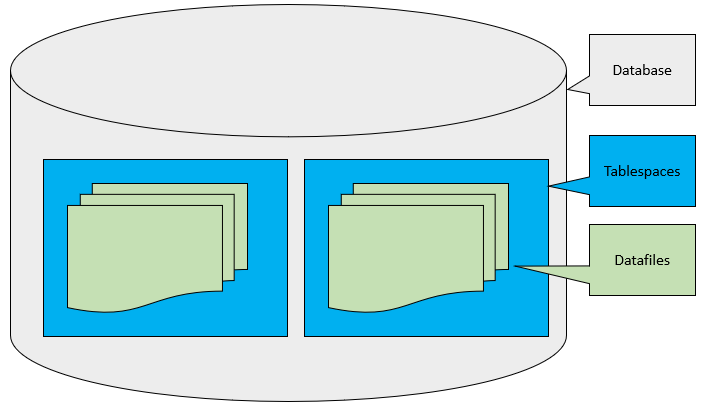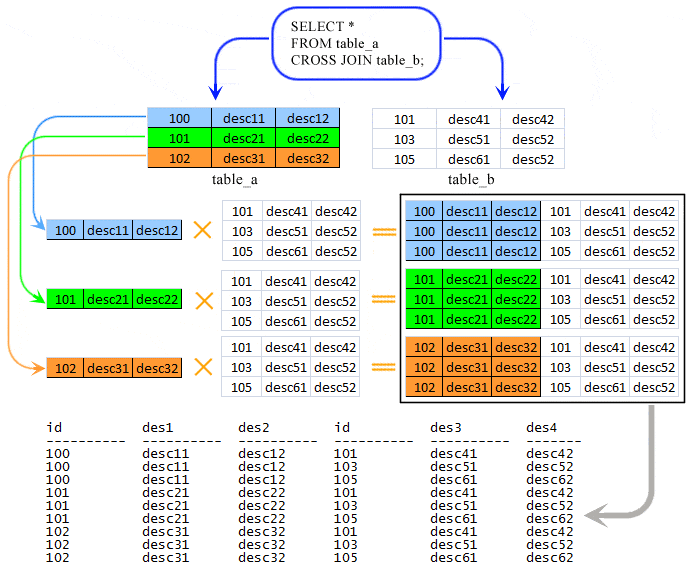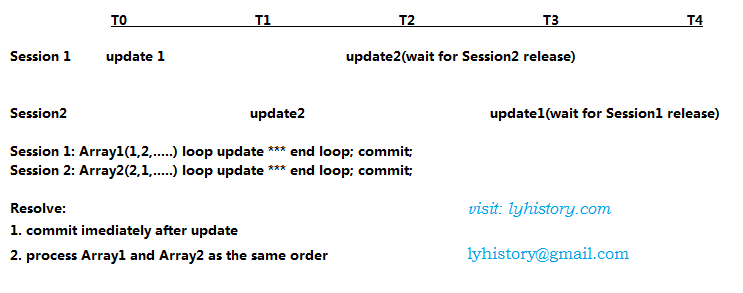回目录 《oracle实用基础》
1. Basics
1.1 Concepts
tablespace datafiles

1.2 Setup
server: 配置TNSNAMES.ORA files are located on both client and server systems. https://www.orafaq.com/wiki/Tnsnames.ora
oracle+tomcat连接池 在实际应用开发中,特别是在WEB应用系统中,如果JSP、Servlet或EJB使用JDBC直接访问数据库中的数据,每一次数据访问请求都必须经历建立数据库连接、打开数据库、存取数据和关闭数据库连接等步骤,而连接并打开数据库是一件既消耗资源又费时的工作,如果频繁发生这种数据库操作,系统的性能必然会急剧下降,甚至会导致系统崩溃。数据库连接池技术是解决这个问题最常用的方法,在许多应用程序服务器(例如:Weblogic, WebSphere,JBoss)中,基本都提供了这项技术,无需自己编程,但是,深入了解这项技术是非常必要的。 https://www.cnblogs.com/lbangel/p/3406084.html
client:
oracle for linux developer
download and install instant client https://www.oracle.com/sg/database/technologies/instant-client/linux-x86-64-downloads.html
rpm -qa|grep oracle
rpm -ivh oracle-instantclient11.2-basic-11.2.0.4.0-1.x86_64.rpm
rpm -ivh oracle-instantclient11.2-devel-11.2.0.4.0-1.x86_64.rpm
rpm -ivh oracle-instantclient11.2-sqlplus-11.2.0.4.0-1.x86_64.rpm
# export environment variables required by "sqlplus" command
export ORACLE_HOME=/usr/lib/oracle/11.2/client64
export LD_LIBRARY_PATH=$ORACLE_HOME/lib:.
export PATH=$PATH:$ORACLE_HOME/bin
https://oracle.github.io/node-oracledb/INSTALL.html#quickstart
oracle for .net developer
Oracle.DataAccess.dll Oracle Client http://www.oracle.com/technetwork/database/enterprise-edition/downloads/112010-win32soft-098987.html
Full installation Oracle SQL Developer http://www.oracle.com/technetwork/developer-tools/sql-developer/downloads/index.html Register Oracle DLL into global assembly cache. http://msdn.microsoft.com/en-us/library/dkkx7f79(v=vs.110).aspx
download http://www.oracle.com/us/products/tools/utilsoft-087491.html
install.bat all
Oracle.DataAccess.Client.OracleException: The provider is not compatible with the version of Oracle client For web projects, the iis express by default will use 32bit as standard, two ways can solve this issue:
- install 32 bit ODAC https://www.oracle.com/technetwork/topics/dotnet/utilsoft-086879.html
- enale iis express settings to 64 bit version: vs2017 for example, tools=>Options=>Projects and Solutions => Web Projects => Use the 64 bit version ODAC 11.2 Release 5 and Oracle Developer Tools for Visual Studio (11.2.0.3.20) https://www.oracle.com/technetwork/topics/dotnet/utilsoft-086879.html
Oracle.DataAccess Version compatible issue:
Register to global cache
Change newVersion in dependentAssembly in web.config
<dependentAssembly>
<assemblyIdentity name="Oracle.DataAccess" publicKeyToken="31bf3856ad364e35" culture="neutral"/>
<bindingRedirect oldVersion="2.111.6.0" newVersion="4.112.3.0"/>
</dependentAssembly>
Reference: https://docs.oracle.com/html/E10927_01/InstallVersioningScheme.htm http://www.oracle.com/technetwork/database/windows/downloads/utilsoft-087491.html
using sql developer
before debug need to ‘compile for debug’ missing connection menu: https://amoratech.wordpress.com/2011/09/25/sql-developer-3-0-3-0-04-34-connection-menu-is-missing/ Import from Excel into Oracle www.thatjeffsmith.com/archive/2012/04/how-to-import-from-excel-to-oracle-with-sql-developer/
execute store procedure manually
var RESULT refcursor;
exec sp('id1;6?id2;2?id3;4?id5;11?id4:10',:RESULT);
print RESULT;
2.常用语法
2.1 CRUD
update with inner join: http://stackoverflow.com/questions/2446764/update-statement-with-inner-join-on-oracle
Cross Join
http://www.w3resource.com/oracle/joins/oracle-cross-join.php

Merge Statement merge into table t1 using table t2 on (t1.id=t2.id) when match then update set XXX when not match then insert XXX;
Insert All when else https://docs.oracle.com/cloud/latest/db112/SQLRF/statements_9014.htm#i2111652 INSERT ALL INTO sales (prod_id, cust_id, time_id, amount) VALUES (product_id, customer_id, weekly_start_date, sales_sun) INTO sales (prod_id, cust_id, time_id, amount) VALUES (product_id, customer_id, weekly_start_date+1, sales_mon) INTO sales (prod_id, cust_id, time_id, amount) VALUES (product_id, customer_id, weekly_start_date+2, sales_tue) INTO sales (prod_id, cust_id, time_id, amount) VALUES (product_id, customer_id, weekly_start_date+3, sales_wed) INTO sales (prod_id, cust_id, time_id, amount) VALUES (product_id, customer_id, weekly_start_date+4, sales_thu) INTO sales (prod_id, cust_id, time_id, amount) VALUES (product_id, customer_id, weekly_start_date+5, sales_fri) INTO sales (prod_id, cust_id, time_id, amount) VALUES (product_id, customer_id, weekly_start_date+6, sales_sat) SELECT product_id, customer_id, weekly_start_date, sales_sun, sales_mon, sales_tue, sales_wed, sales_thu, sales_fri, sales_sat FROM sales_input_table;
2.2 Handle Exception
https://docs.oracle.com/cd/A97630_01/appdev.920/a96624/07_errs.htm
2.3 temp table
create temp table inside sp need extral permission 1)ON COMMIT DELETE ROWS 事务级 transaction 2)ON COMMIT PRESERVE ROWS 会话级 session
split string into temp table http://stackoverflow.com/questions/27786412/oracle-stored-procedure-split-string-for-insert-or-update-to-a-table http://stackoverflow.com/questions/29557207/split-string-and-iterate-for-each-value-in-a-stored-procedure http://www.techonthenet.com/oracle/index.php
2.4 Transpose Column to Row 列转行
PIVOT https://oracle-base.com/articles/11g/pivot-and-unpivot-operators-11gr1 http://www.2cto.com/database/201206/136218.html http://blog.sina.com.cn/s/blog_4adc4b090101ges3.html
2.5 Dynamic SQL
http://docs.oracle.com/cd/B28359_01/appdev.111/b28370/dynamic.htm https://docs.oracle.com/cd/B28359_01/appdev.111/b28370/dynamic.htm#i13057 Dynamic PL/SQL date parameter with time value retained https://stackoverflow.com/questions/18455867/dynamic-pl-sql-date-parameter-with-time-value-retained
2.6 Group
**by having ** Dates: Grouping date-time values into {n} minute buckets. http://steve-lyon.blogspot.sg/2011/08/bucketing-up-date-times-by-various.html ** sum(decode( ** ** common table expression ** with r as (select username, productid, sum(amt) shoppingamt from transactionlog where transdate = date’2014-06-11’ group by GROUPING SETS((username, productid), (productid)) )
select * from r where username is null;
with r as (select productid, sum(amt) shoppingamt
from transactionlog where transdate = date'2014-06-11'
group by rollup(productid)
)
select * from r ;
2.7 Package level&Schema level
Receive Array/Table as input a.Type in database level - can be used as a nested table
create or replace TYPE associateArray IS TABLE OF varchar2(100);
arrayDatabaselevel :=new associateArray();
arrayDatabaselevel.extend(1);
arrayDatabaselevel(1) := 'test';
select * from table(arrayDatabaselevel)
b.Type in Package level - can only be used in loop
create or replace PACKAGE PKG_helloworld AS
TYPE associateArray IS TABLE OF varchar2(100) INDEX BY BINARY_INTEGER;
END PKG_helloworld ;
-------------------
create or replace PROCEDURE test(
arrayPackageLevelin PKG_helloworld.associateArray
).........................
if arrayPackageLevelis not null then
for i in 1 .. arrayPackageLevel.count loop
if (arrayPackageLevel(i) is not null) then
name := regexp_substr(arrayPackageLevel(i), '[^,]+', 1, 1); number := to_number(regexp_substr(arrayPackageLevel(i), '[^,]+', 1, 3));date := to_date(regexp_substr(arrayPackageLevel(i), '[^,]+', 1, 2),'yyyy-mm-dd hh24:mi:ss');
c.Mixed
arrayDatabaselevel := associateArray();
arrayDatabaselevel.extend(arrayPackageLevel.count);
for i in arrayPackageLevel.first .. arrayPackageLevel.last loop
arrayDatabaselevel(i) := arrayPackageLevel(i);
end loop;
important deadlock issue here:

2.8 exec store-procedure and export to csv file
set colsep ','
var input1 VARCHAR2(10);
var input2 VARCHAR2(10);
var results REFCURSOR
begin
:input1 := '2016-01-01';
:input2 := '100';
storeProcedure(:input1,:input2,:results);
end;
/
spool /tmp/results.csv
print results;
###
declare
v_sql varchar2(5000);
begin
v_sql := q'[select
col1||','||
col2
from
(
select * from ***
)
order by col1]';
dump_sql_to_csv(v_sql, 'example.csv');
end;
/
2.9 Scheduler
https://docs.oracle.com/cd/B28359_01/server.111/b28310/schedadmin006.htm https://docs.oracle.com/cd/B28359_01/server.111/b28310/scheduse004.htm#ADMIN12413 Scheduler Running log https://docs.oracle.com/cd/E18283_01/server.112/e17120/scheduse008.htm
2.10 build-in functions
regexp_substr: https://www.techonthenet.com/oracle/functions/regexp_substr.php
analytic functions: –https://oracle-base.com/articles/misc/rank-dense-rank-first-last-analytic-functions select t1.id, min(amt) keep (DENSE_RANK FIRST ORDER BY datecreated desc) as amount from money_transferlog t1 group by t1.id
复制
ORACLE 几种同步灾备手段(OGG,ADG,DSG,高级复制,流复制,logmnr)
3.troubleshooting
?# :ORA-01861: literal does not match format string e.g date format, need to convert s_dateList(i):= to_date(dateList(i),’yyyy-mm-dd hh24:mi:ss’);
?#-1 No Data found: always handle exception for ‘select column into ***’
?#0 insert special character : ‘ & http://www.blogjava.net/pengpenglin/archive/2008/01/16/175689.html
?#1 parameter name cannot be the same with column name !!! SELECT × FROM TABLE COL_NAME=INPUT_NAME exact fetch returns more than requested number of rows
?#2 date format wrong: to_char(DateColumn, ‘yyyy-MM-dd hh:mm:ss’) correct: to_char(DateColumn, ‘yyyy-MM-dd hh24:mi:ss’)
?#3 Input is too long (> 2499 characters) - line ignored Sol: if it happens in store procedure, simply make it multi lines instead one long single line
?#4 no data found Exception
select sum(*) count(1) into won’t cause exception,
select <col> into
create or replace PROCEDURE
(
list in PKG.associateArray,
result out sys_refcursor
)
AS
counter int;
msg varchar2(1000);
BEGIN
if list is not null then
for i in 1 .. list.count loop
if (list(i) is not null) then
BEGIN
select count(1) into counter from t1 where t1.userid='**';
if(counter > 0) then
do something here
select col from t2 where t2.userid='***';
do somethingelse here...
end if;
END
end if;
end loop;
end if;
end ;
this is the common error we all may have write like that, correct one should be :
create or replace PROCEDURE
(
list in PKG.associateArray,
result out sys_refcursor
)
AS
counter int;
msg varchar2(1000);
BEGIN
if list is not null then
for i in 1 .. list.count loop
if (list(i) is not null) then
BEGIN
select count(1) into counter
from t1
inner join t2 on t1.userid=t2.userid
where t1.userid='**';
if(counter > 0) then
do something here...
select col from t2 where t2.userid='***';
do somethingelse here...
end if;
END
end if;
end loop;
end if;
end ;
or you can add exception handling into your sp.
?#5 to_date error :ORA-01841: (full) year must be between -4713 and +9999, and not be 0 select regexp_instr(‘2016-08-01 23:59:59’, ‘\d{4}-\d\d-\d\d \d{2}:\d{2}:\d{2}’) from dual;
todo: /× array like parameters method 1: string split method 2: Array split method 3: clob split ×/ /× quotes http://www.techonthenet.com/oracle/questions/quotes.php ×/ Concatenation Operator https://docs.oracle.com/cd/B19306_01/server.102/b14200/operators003.htm
Best Practice: COALESCE NVL NVL is Oracle specific, it was introduced in 80’s before there were any standards. NVL always evaluates both arguments, while COALESCE usually stops evaluation whenever it finds the first non-NULL Master DB (used by live system/application), Slave DB (readonly db, for backup), Reporting DB (for analysis)
?#TNS:address already in use http://www.dba-oracle.com/t_ora_12542_tns_address_already_in_use.htm
#################################################################################
## Code snippets
#################################################################################
CREATE OR REPLACE TYPE "Array" IS TABLE OF VARCHAR2(100);
CREATE OR REPLACE FUNCTION STR2ARRAY(
strSource IN VARCHAR2,
delimiter IN VARCHAR2 DEFAULT ','
)
RETURN Array
AS
count NUMBER;
temp VARCHAR2(999999):=strSource||delimiter;
array Array := Array();
BEGIN
LOOP
count := instr(temp, delimiter );
EXIT WHEN (NVL(count,0) = 0);
array.EXTEND;
array(array.COUNT) := LTRIM(RTRIM(SUBSTR(temp, 1, count-1)));
temp := SUBSTR(temp,count+ LENGTH(delimiter) );
END LOOP;
RETURN array;
END STR2ARRAY;
select distinct t1.AA as AA,t2.BB as BB
from table1 t1
inner join
(
select
t_1.column_value as A,
t_2.column_value as B
from
(
select rownum id, column_value
from table(STR2ARRAY('TEST'))) t_1
join
(
select rownum id , column_value from table(STR2ARRAY('TEST2'))
) t_2 on t_1.id = t_2.id
) t2 on t1.AA= (case when t2.A = 'TEST then 'Y' else 'N' end)
where not exists (
select 1
from table3 t3
where t3.C = t2.B
);
SELECT id,
field,
DECODE(NVL(field, 'No'), 'Yes', 'Yes Result do this', NVL(field, 'No'), 'No result do this', 'catch all result do this')
FROM table
or
SELECT id,
field,
CASE NVL(field, 'No')
WHEN 'Yes' THEN 'Yes Result do this'
WHEN 'No' THEN 'No result do this'
ELSE 'catch all result do this'
END
FROM table
/*
t1: id
t2: id,t1_id,amt
select temp.totalAmt
from t1 t1
left join (select t1_id,sum(amt) as totalAmt from t2 group by t1_id) temp on temp.t1_id=t1.id;
*/
/*select * from table where trunc(datefield)=trunc(TO_DATE('15/01/16', 'DD/MM/YY'));*/
/*
select count,total,average
from(
select t1_id,count,total,case when nvl(count,0)=0 then 0 else round(total/count,2) end as average
from(
select t1_id, count(*) as count, sum(amt) as total
from t2
group by t1_id
)
)
where average>5;
*/
/×
array like parameters
method 1: string split
method 2: Array split
method 3: clob split
×/
/×
quotes
http://www.techonthenet.com/oracle/questions/quotes.php
×/
Concatenation Operator https://docs.oracle.com/cd/B19306_01/server.102/b14200/operators003.htm
Best Practice:
Master DB (used by live system/application), Slave DB (readonly db, for backup),
Reporting DB (for analysis)
Big Data Sqoop ? Hbase?